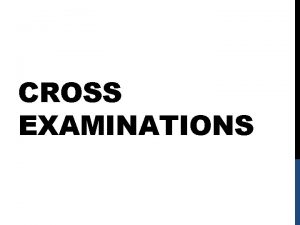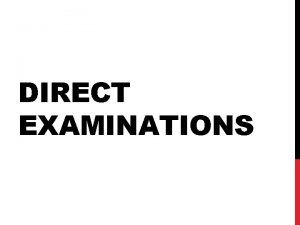CROSS EXAMINATIONS GOOD CROSS EXAMINATIONS Show the judge






- Slides: 6

CROSS EXAMINATIONS

GOOD CROSS EXAMINATIONS… Show the judge and jury that a given witness should not be believed because that witness… 1. 2. 3. 4. 5. Cannot remember facts Did not give all of the facts in the direct Told a different story at some other time Has a reputation for lying Has a special relationship with or bias towards one of the parties 6. Has a prior conviction 7. Did not have an adequate opportunity to observe • • Physical impediments to sight, sound, senses (bad lighting, distance, speed, etc. ) Subjective impediments to sight, sound, senses (drugs, mental illness, fatigue) Distractions that divert attention (conversations, noises) Diminished memory by time and events

TIPS FOR CROSS Know what to expect Be prepared to “impeach, ” but don’t bluff. “If in doubt, leave it out. ” • • • Has this witness hurt your case? Is this witness important? Don’t give them a chance to fix a major problem/omission Limit the scope of the cross examination to FOUR or FIVE main points for most witnesses Be confident. • You are in charge, but don’t badger/bully the witness

TIPS FOR CROSS Start and finish strong Stop when you are ahead. Know when to quit! ALWAYS BE LEADING!! NO OPEN-ENDED QUESTIONS!! • Don’t let witnesses explain • No “hows” or “whys” Do not ask a question that you do not ALREADY know the answer to

TIPS FOR CROSS Don’t repeat the direct Avoid complicated, long-winded questions. • Build with short, concise questions Don’t tip off your end point • Build with short, concise questions to lay the trap Make them answer the question, and be obvious about it Listen to the answer

ALWAYS BE LEADING!! The way the question is asked tends to suggest the answer. “…didn’t you? ” “…correct? ” “Isn’t it true…” Leading questions may be asked during the cross-examination, but NOT DURING DIRECT-EXAMINATIONS! An example of a direct question is “Mr. Bryant, can you please tell us what happened to you on the night of July 23 rd? ” An example of a leading question is “Mr. Bryant, isn’t it true that you were drinking on the night of July 23 rd? ”











